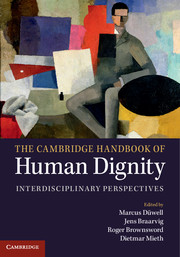Book contents
- Frontmatter
- Contents
- List of contributors
- Foreword
- Why a handbook on human dignity?
- Acknowledgments
- 1 Human dignity from a legal perspective
- 2 Human dignity: concepts, discussions, philosophical perspectives
- Part I Origins of the concept in European history
- Part II Beyond the scope of the European tradition
- 13 The concepts of human dignity in moral philosophies of indigenous peoples of the Americas
- 14 Human dignity in the Islamic world
- 15 Hinduism: the universal self in a class society
- 16 Buddhism: inner dignity and absolute altruism
- 17 Human dignity in traditional Chinese Confucianism
- 18 Dignity in traditional Chinese Daoism
- Part III Systematic conceptualization
- Part IV Legal implementation
- Part V Conflicts and violence
- Part VI Contexts of justice
- Part VII Biology and bioethics
- Appendix 1 Further reading
- Appendix 2 Universal Declaration of Human Rights
- Index
- References
16 - Buddhism: inner dignity and absolute altruism
from Part II - Beyond the scope of the European tradition
Published online by Cambridge University Press: 05 March 2015
- Frontmatter
- Contents
- List of contributors
- Foreword
- Why a handbook on human dignity?
- Acknowledgments
- 1 Human dignity from a legal perspective
- 2 Human dignity: concepts, discussions, philosophical perspectives
- Part I Origins of the concept in European history
- Part II Beyond the scope of the European tradition
- 13 The concepts of human dignity in moral philosophies of indigenous peoples of the Americas
- 14 Human dignity in the Islamic world
- 15 Hinduism: the universal self in a class society
- 16 Buddhism: inner dignity and absolute altruism
- 17 Human dignity in traditional Chinese Confucianism
- 18 Dignity in traditional Chinese Daoism
- Part III Systematic conceptualization
- Part IV Legal implementation
- Part V Conflicts and violence
- Part VI Contexts of justice
- Part VII Biology and bioethics
- Appendix 1 Further reading
- Appendix 2 Universal Declaration of Human Rights
- Index
- References
Summary
In Buddhism, as in the Hindu tradition, the concept of dignity appears in different and paradoxical qualities. As in Hinduism, in Buddhism there exists a tension between dignity which is inherent to all living beings and socially embedded dignity which appears in different gradations. In this chapter, I will focus primarily on dignity in classical and Mahāyāna Buddhism.
‘Since beginning-less time’ man is imprisoned in the round of rebirth, and whether he is born as an animal, spirit, human in a high or low class, in hell or even as a divine being, is entirely dependent on karma: action understood as a cause which explains a being's (way of) existence. This is reflected in the idea that the individual is completely responsible for his own existence: what one is depends wholly on one's previous actions – in this life and the ones preceding it. Indeed, in Buddhism we find a type of radical individualism: one's (well)being and fate is in a very fundamental sense an individual affair. This is a basic premise shared by nearly all Indian philosophical and religious traditions, but where Buddhism differs from the others is that it understands existence to be characterized by impermanence and emptiness – everything perishes the moment it comes into existence. This also means that there is in the strict sense no such thing as ‘the self’: beings, like all other things, lack essence. Insight in the nature of existence, combined with concentrational and meditative practices, may allow the individual to realize the end of his own suffering/disquietude: the end of further rebirth, the extinction of the self in nirvāṇa. Thus, in Buddhism, the individual is absolutely responsible for his own existence: his past actions are the cause of his direction towards good or bad or towards the final freedom one may seek by adopting a monk's life and isolating himself from society – solely focused on his individual salvation.
- Type
- Chapter
- Information
- The Cambridge Handbook of Human DignityInterdisciplinary Perspectives, pp. 170 - 176Publisher: Cambridge University PressPrint publication year: 2014
References
- 1
- Cited by



